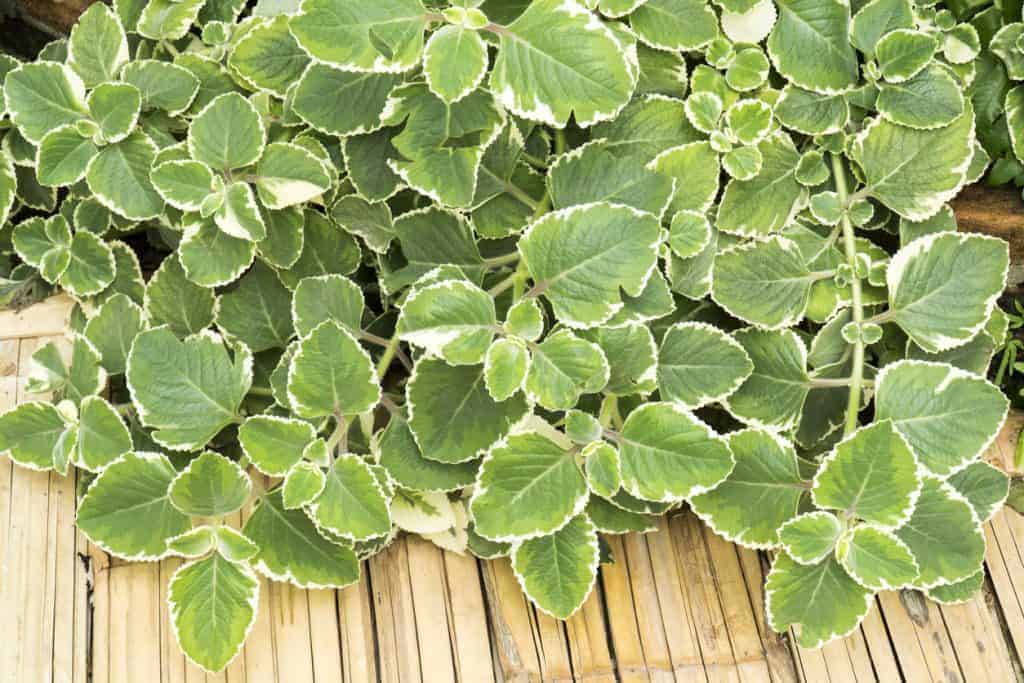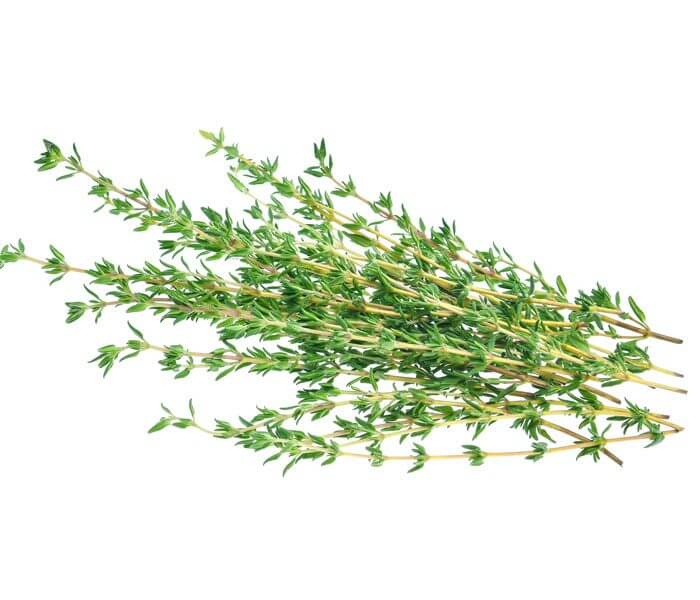SUMMARY
Thyme, especially Thymus vulgaris—the variety that you are likely to find in our local grocery stores—is safe for dogs to eat in moderation.
So, feeding your dog this variety of Thyme in moderation is not only perfectly okay but can also have a positive impact on his health in so many ways, including:
- Improved digestive health
- Protection against cellular damage from free radicals
- Suppression of bacterial and fungal growth
- Fighting gingivitis
- Remedy for urinary tract infection.
BUT consumption of copious amounts of thyme carries a few risks like indigestion and reduced efficiency of blood clotting in dogs.
Additionally, certain varieties of thyme like the less common Spanish variety (Coleus amboinicus) are toxic to dogs and should be avoided.
Most of the culinary herbs that we grow in our backyards are packed with tons of vitamins, minerals, and other nutrients.
And most of them are not only safe for our dogs to consume but can also help heal or prevent a wide range of health problems.
Even better, some of the herbs are easily digestible for our canine companions, particularly when finely chopped or ground to a powder (in the case of dried herbs).
But not all herbs are safe for our pups!
So, which ones can you use to add some flavor or additional nutrients to your dog’s food?
Can dogs eat thyme?
Well, since we cannot cover all herbs in one blog post, let’s focus on thyme.
What is Thyme?

Thyme is a perennial, evergreen herb in the genus Thymus of the mint family, Lamiaceae.
Its leaves grow on clusters of thin stems and produce small white, pink, or lilac flowers.
The colors of its leaves often vary from pale green shades to shades of olive, bronze, silver, and deep green.
There are over 350 species of thyme because they tend to hybridize fast.
However, the most common variety that you are likely to find in many homes’ spice racks is the Thymus vulgaris or common thyme.
It is native to the Mediterranean region though it is currently cultivated in the US, Portugal, France, and Spain.
Thyme is widely used as a food seasoning, either by itself or alongside other herbs like sage, rosemary, or marjoram.
It is fit for every dish and can be consumed by anyone looking to enjoy the flavor of fresh herbs.
Can Dogs Eat Thyme?
The short answer is: Yes, thyme is safe for dogs.
Dogs can consume moderate amounts of thyme without any issue.
In fact, the American Society for the Prevention of Cruelty to Animals (ASPCA) considers thyme to be non-toxic to pets, including dogs.
The herb is also categorized as GRAS or “generally recognized as safe” by the Food and Drug Authority (FDA).
However, because it is fibrous, too much of it can leave your pup with an upset stomach.
Thyme Benefits for Dogs
Here are some of the top benefits that your pup stands to gain if you sprinkle some fresh springs of thyme on his food:
- Improves Your Dog’s Digestive Health: The herb packs excellent carminative and antispasmodic properties, making it suitable for treating conditions like irritable bowel, dyspepsia, colitis, and indigestion in dogs.
- Can protect against cellular damage from free radicals: Thyme is rich in a wide range of vitamins and minerals, including A, C, K, iron, manganese, and calcium, all of which have excellent antioxidant properties to help fight damage caused by free radicals.
- Kills parasitic worms and suppress bacterial and fungal growth: Thyme has an active compound, Thymol, which has potent antibacterial and antiseptic properties. So, it can help expel parasites like hookworms and suppress the growth of fungal and bacterial pathogens. Using thyme oil on your dog’s skin can also help eliminate bacterial and fungal infection of the skin.
- Thymol can also fight gingivitis in dogs. Simply apply a thyme tincture or a strong thyme tea on your dog’s gums or infected sites using a cotton swab.
- May help treat urinary tract infection in dogs due to its antimicrobial properties. The herb is also believed to be a mild astringent tonic and can, therefore, be used for urinary incontinence in dogs.
Is Thyme Toxic For Dogs? (Here are the Potential Dangers)

Is thyme poisonous to dogs?
Well, there are a few issues with thyme consumption in dogs.
As aforementioned, allowing your dog to consume large quantities of thyme can result in indigestion, leading to gastrointestinal distress.
Concentrated thyme essential oil is also not recommended for dogs.
Like any other essential oil, exposing your dog to concentrated thyme essential oil may cause vomiting, seizures, and diarrhea among other health issues.
Ensure that you dilute thyme oil with an appropriate carrier oil before using it on your dog.
Remember to also administer the oil in small quantities and use it as directed by the manufacturer.
Thyme may also slow blood clotting, so it is believed that it might increase the risk of excess bleeding during and after surgery.
Consequently, if your dog is scheduled for surgery or has undergone a surgical procedure, don’t give him thyme.
Beware of Spanish Thyme

Although common thyme is safe and beneficial to dogs, Spanish thyme is toxic to dogs.
The herb contains diterpene, a chemical that’s known to lower blood pressure in dogs.
The plant’s sap also contains thymol, carvacrol, eugenol, and methyl eugenol that can be quite irritating to your dog’s skin and gastrointestinal tract (when consumed).
Toxicity can be mild or severe, depending on how much of the herb your dog has consumed.
Typical symptoms of Spanish thyme poisoning in dogs include vomiting, diarrhea, anorexia, difficulty in breathing, occasionally bloody diarrhea, and depression.
If you suspect that your dog has consumed some Spanish thyme, rush him to a local vet immediately.
Remember to carry a sample of the plant because your vet may need to perform emesis and carry out a few tests on your dog’s stomach content for traces of the plant.
Spanish thyme is also known by other names, including East Indian thyme, Coleus, Indian Borage, Country Borage, Bread and Butter plant, and stinging thyme among other names.
Tips on How to Feed Thyme to Your Dog Safely

- Like any other food, if you are giving thyme to your dog for the very first time, start with small amounts. If consumed in small quantities, your dog will get to enjoy the wonderful health benefits of the herb without exposing him to any potential side effects of the plant.
- The best way to give your dog thyme is to sprinkle some fresh or dried ones on your dog’s favorite dry or wet food. You can also add some to his homemade dog treats. And to get rid of gingivitis, you can simply use a sprig of thyme to brush your pup’s teeth as would a typical doggie toothbrush. Alternatively, add some thyme oil to your pup’s water occasionally as a gum cleaner or breathe freshener.
- Since thyme stems are fibrous, they may not break down during cooking. So, if you decide to use whole thyme stems, consider picking them out before serving the food to your dog.
- To keep your dog healthy, always choose thyme leaves that have not been sprayed with herbicides or pesticides. Whenever possible, buy organic thyme and always wash them thoroughly before giving any to your dog.
- If you can, grow some thyme in your garden and use that for your dog instead of giving something you don’t know its source.
FAQs

1. Can Dogs Eat Dried Thyme?
The non-toxic varieties of thyme (like Thymus vulgaris) can be enjoyed by dogs fresh or dried.
If your dog loves his treats crunchy, he can always enjoy dried thyme without any threat of adverse effects on his health.
2. Is Lemon Thyme Safe For Dogs?
Like Thymus vulgaris, Lemon Thyme (Thymus citriodorus) is pretty safe for dogs to consume in moderation.
3. Is Creeping Thyme Safe For Dogs? (Is Red Creeping Thyme Safe For Dogs?)
Yes. Creeping thyme (Thymus serpyllum) is safe and non-toxic for dogs.
With its beautiful foliage and low-maintenance requirements, creeping thyme is one of the best, dog-safe ground covers you can use to create an inviting outdoor space.
4. Is Woolly Thyme Safe For Dogs?
Wooly thyme (Thymus pseudolanuginosu) is a variety of creeping thyme. The only major difference between wooly and creeping thyme is their foliage.
While wooly thyme manifests fuzzy, gray foliage, creeping thyme has silvery-green and almost smooth foliage.
Like creeping thyme, wooly thyme is safe and non-toxic for dogs.
5. Can Dogs Have Sage and Thyme?
Yes. Dogs can have moderate quantities of these herbs without any threat of toxicity.
As aforementioned, thyme has a lot of positive effects on a dog’s gastrointestinal system due to its antibacterial and anti-spasmodic properties.
Similarly, sage is known to possess potent anti-microbial, antioxidant, and anti-bacterial properties, making it effective in boosting the immune system in dogs.
It is also known to minimize seasonal allergies in dogs.
6. Can Dogs Eat Thyme and Oregano?
Oregano is a rich source of fiber, omega-3, minerals (like iron, calcium, and manganese) and Vitamins A, C, & K.
It is also rich in antioxidants that can go a long way in helping your pup fight free radicals and potential cell damage.
So, the short answer to the above question is: Yes, dogs can consume moderate amounts of the two herbs without any adverse effects on their health.
7. Can Dogs Eat Thyme and Rosemary?
Rosemary is not only rich in iron and calcium but also possesses potent antioxidant and antimicrobial properties.
It is, therefore, okay to add to your dog’s diet in moderation.
So, you can feed your pup these two herbs without any worry about their impact on his/her health.
But be warned that exposing your dog to copious amounts of the herbs can cause stomach upset and other health issues.
8. Is Thyme Essential Oil Safe For Dogs? (Is thyme oil safe for dogs?)
As aforementioned, thyme essential oil is safe for dogs when it is properly diluted.
But concentrated thyme essential oil is toxic for dogs.
Like any other essential oil, exposing your dog to concentrated thyme essential oil may cause vomiting, seizures, and diarrhea among other health issues.
Always ensure that you dilute thyme oil with an appropriate carrier oil before using it on your dog.
9. Can Dogs Have Thyme Seasoning?
While certain seasonings are toxic and should never be part of your pup’s diet, some are perfectly safe to eat and packs a host of health benefits.
Thyme seasoning falls in the latter group.
Apart from the improved taste thyme can add t your dog’s meals, it is packed with many nutritional benefits for your doggie’s health (as highlighted in the previous sections).
Final Thoughts
Thyme is a potent herb that is not only safe for pets but packs tons of healthy benefits.
However, for your dog to get the most out of this flavorful herb, feed him in moderation.
Beware of the highlighted potential dangers as well, and talk to your vet in case you notice some weird symptoms in your dog, especially after consuming thyme.
To help you stay informed and keep your pup safe, here are more resources on what dogs can and cannot eat:
Can Dogs Eat Pimentos?
Can Dogs Eat Capers?
Is Stevia Safe for Dogs?
Can Dogs Eat Acai Berries?
Can Dogs Eat Chayote?
As an Amazon Associate, we may receive a small commission from qualifying purchases but at no extra cost to you. Learn more. Amazon and the Amazon logo are trademarks of Amazon.com, Inc, or its affiliates.

